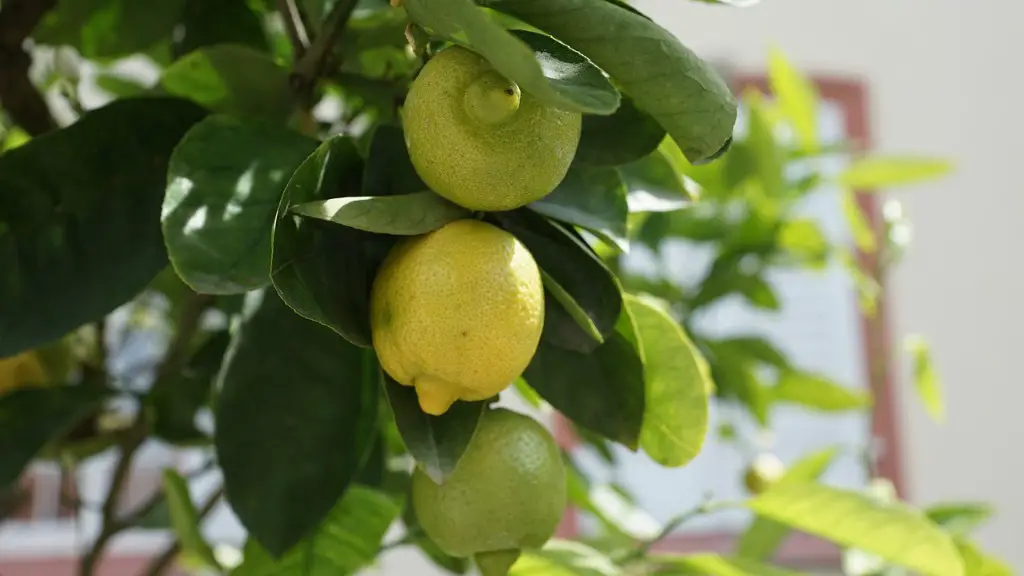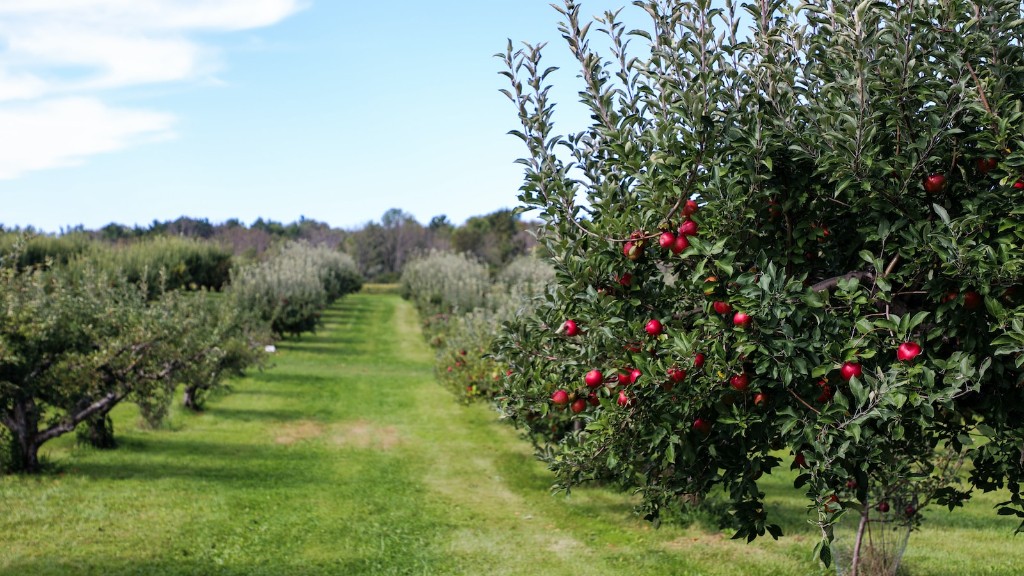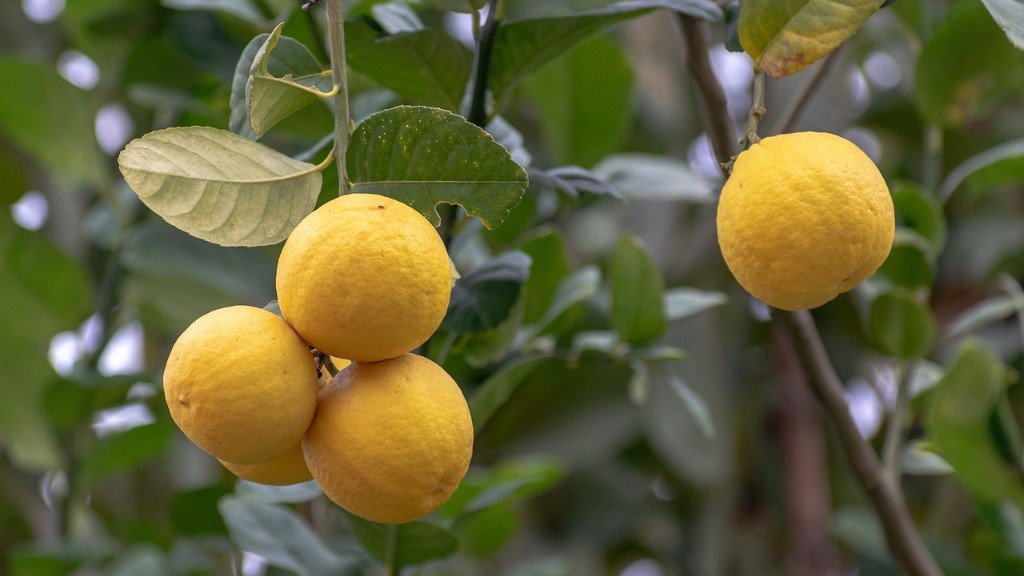Lemon trees are among the most popular citrus trees grown in home gardens throughout the United States. But can Pennsylvania residents cultivate this tart fruit in their gardens? The answer is – yes, but with a few precautions. Growing a lemon tree in Pennsylvania can require a bit of extra work, but with the right conditions, it is not impossible.
The lemon tree (Citrus limon) is an evergreen tree which can reach heights of up to 20 feet, although it is generally a lot smaller when grown in a pot or container. Lemon trees need plenty of sunlight and slightly acidic, moist soil. Generally, lemon trees cannot tolerate temperatures lower than 28 degrees Fahrenheit.
In Pennsylvania, the temperatures tend to dip to 32 degrees or less in the winter months – and frost can be a common occurrence. Therefore, for your lemon tree to thrive, it is important to provide it with extra protection during cold snaps. During the growing season, lemon trees can tolerate temperatures as high as 95 degrees Fahrenheit.
Lemon trees can be grown from seed. However, the lemon tree has to be grafted onto the rootstock of another citrus tree such as an orange or lime tree. This ensures that the lemon tree is more likely to bear fruit, as it will contain characteristics of both the rootstock and the lemon tree itself. It also makes it hardier and more resistant to disease.
An alternative is to buy a pre-grafted lemon tree from a professional nursery that specializes in citrus. This is your best option if you want a tree that fruits in the first few years rather than waiting for it to produce fruit.
Potted lemon trees should be moved indoors during winter. A warm and bright spot inside the home makes for the ideal spot for growing lemon trees in cold climates. When the temperatures warm up, the tree can be moved back outdoors to enjoy the sunlight.
With the right amount of care, a lemon tree can certainly thrive in Pennsylvania. It may take a little extra effort, but with patience and dedication, Pennsylvania residents can grow their very own lemon tree and enjoy its sweet-tart fruits year-round.
Harvesting and Pruning
If you want to get the most out of your lemon tree, it’s important to practice good harvesting and pruning habits. Lemon trees are typically ready for harvest once the fruits have achieved their maximum size, which is usually around four or five months after the tree begins flowering. To ensure maximum flavor, it’s best to wait until the fruit is fully ripe before harvesting.
Most citrus farmers prune their lemon trees twice a year – once at the start of the growing season and once at the end. Pruning is important as it helps to encourage the tree to produce more fruits by increasing its airflow. This helps to ward off disease and excessive pests. Furthermore, pruning helps to keep the tree from becoming too densely packed, which can lead to a decrease in the quality of the fruit.
Good pruning also prevents the tree from growing too large and causing structural issues. Applying copper-based fungicides and insecticides after pruning can help to protect the tree from potential infections and pests.
Soil and Fertilizers
Good soil is essential for the successful cultivation of a lemon tree. The soil should be slightly acidic and well-draining. A soil pH of between 6.0 and 7.0 is ideal, but anything within a range of 5.8 to 7.5 will suffice. Incorporating a good amount of compost or manure into the soil can help to provide the right nutrients and acidity for lemon tree growth. It is also a good idea to supplement the soil with some nitrogen fertilizer to maintain a good level of nitrogen throughout the tree’s life.
Regular feeding of the tree is necessary in order to ensure a good supply of nutrients and keep the roots healthy. Fertilizers specifically formulated for citrus trees, such as Citrus Formula, can be applied about once a month during the growing season. However, if the soil is already quite nutrient-rich, then fertilizing may not be necessary.
It is important to understand that fertilizers should only be applied when absolutely necessary, and too much fertilizer can be a hindrance. Lemon trees are quite sensitive to over-fertilizing, which can result in poor growth, rotting of the fruit, and a decrease in overall vigor.
Protecting from Pests and Diseases
Lemon trees are vulnerable to several pests, diseases, and fungi. To minimize their risk, it is important to maintain a regular pest-control program and monitor the tree closely for signs of damage or disease. Common pests that may plague lemon trees include aphids, weevils, citrus leafminer, and scale. Diseases such as citrus canker and citrus greening can cause extensive damage, and should be addressed as quickly as possible.
The best way to protect the tree from potential pests and diseases is to apply an insect-protection spray in early spring, before the buds begin to open. The insect-protection spray should contain an insecticide and fungicide that are both systemic and systemic contact. A systemic contact insecticide will act as a deterrent, while a systemic fungicide will help protect the tree against fungal spores, damping off, and rot.
Fungicides should be applied at least three times during the growing season, and the spray should be reapplied when the tree begins to flower. Additionally, it can be a good idea to add some beneficial nematodes to the soil in order to eliminate any pests that may have taken up residence in the tree’s habitat.
Watering and Mulching
Lemon trees need plenty of water throughout the growing season, but care should be taken to not over-water the tree. Watering should be done in the mornings, as this gives the water time to penetrate the soil and get to the roots before the tree gets too hot. Mulching the soil around the tree can also help to conserve moisture and maintain the health of the soil.
Mulching should be done at least once a year, and a layer of mulch four to five inches thick is sufficient. If the soil is dry, then an extra liberal spread of mulch is recommended to ensure that the tree stays well-watered. It is also important to remember to remove any weeds or debris that may be competing with the tree for resources and nutrients. Generally, it is best to keep the area immediately around the tree free of any competing vegetation.
Summer Pruning
Summer pruning is important for lemon trees, as it helps to encourage new growth and reduce the risk of disease. Summer pruning should be done when the tree is dormant, usually during the middle of the year. It should include removing any dead or damaged branches, as well as thinning out any overly dense foliage. This will help to encourage air flow through the tree, which helps to keep it healthy.
During the pruning process, it is important to be careful not to damage any of the fruit-bearing branches. Also, the cuts should never be done too deeply into the branches, as this can lead to an increase in sap flow, which can make the tree more vulnerable to pests and diseases. Sharp pruning shears should be used whenever working with lemon trees to ensure clean, precise cuts.
Common Maintenance
The main factor in determining the success or failure of a lemon tree is the care it receives. Regular watering, fertilization, and pest-control help to ensure a healthy and productive tree year-round. Additionally, it is important to check the tree for signs of damage or disease, and to act quickly to address any issues that arise. When all else fails, it never hurts to call in a professional arborist or citrus specialist to take a look at the tree and advise on its care.
As long as the care instructions are followed, most lemon trees should survive in Pennsylvania. This tart fruit tree will bring with it many years of enjoyment and plenty of lemony treats. It may be a bit of extra effort, but with a little bit of love, Pennsylvania residents can grow a thriving lemon tree in their home garden.




